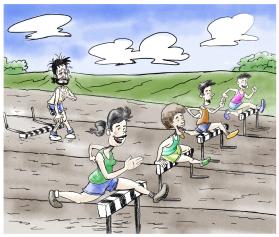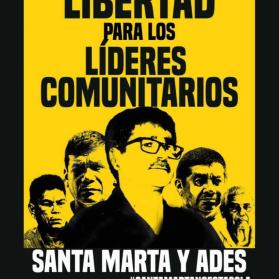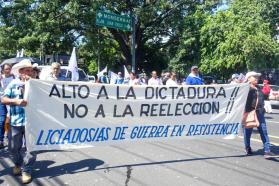Arcatao: Lives Marked by Militarization
*This article was originally published in Spanish by Radio YSUCA in El Salvador. It has been translated and republished by CISPES, with permission. At the request of the sources, names in the original have been changed to protect their identity.
The Zazalapa River divides El Salvador from Honduras. A makeshift fence constructed from bamboo poles indicates that the crossing is closed. On the Honduran side of the river are community settlements [on formerly disputed territory] where Salvadoran families live, having remained there after a 1992 ruling of the International Court of Justice granted the territory to Honduras. Although these residents have Salvadoran IDs, since March 2020 they have been restricted from entering their country and denied the right to healthcare, work, food, services, and other necessities.
It is approximately 9 o’clock in the morning on February 12, 2021: Don Antonio, leaning on his cane, has crossed the river. He has come from Zazalapa, a Salvadoran valley community in the formerly disputed territory, which is now part of Honduras. His goal is to convince the soldiers to let him cross over into Arcatao, in Chalatenango, El Salvador, the next day, as he has to take a sick family member to a medical appointment there. He approaches three soldiers in a friendly tone and explains in detail the reason they will need to cross the border. Five minutes later, the military soldiers nod their heads as a sign that they have reached an agreement.
Don Antonio returns home, assured that the next day he will be able to cross without problems. Since his case is considered an emergency, he will be allowed to pass through—although not without first giving his name and presenting his government ID to the soldiers.
The process that Don Antonio has to undergo in order to enter El Salvador, as a Salvadoran citizen, did not exist before March 2020. The tedious procedure has only been in place, and enforced, since President Nayib Bukele ordered the militarization of some municipalities in Chalatenango, including Arcatao, last year.
One of the militarized areas is that of the Zazalapa River. There, four soldiers live in a cement house that functions as a guard post. They rotate out every week, but while deployed remain day and night to prevent Salvadorans who live in the settlement communities in Honduras from entering their own country. "We don’t want to do that, but those are our orders," said one of the soldiers, the leader of the group. He added that only in cases of medical emergency do they allow Salvadorans to enter El Salvador; if someone enters without authorization, they can be detained. It's been said that the border closure in this area that began in March 2020 will be permanent. For now, the soldiers decide who enters and who leaves.
According to the soldiers, the Minister of Defense, Francis Merino Monroy, has come out to Arcatao to monitor the area. The Defense Minister’s visits were confirmed by a representative from the Arcatao mayor's office, who explained that Monroy has traveled by helicopter to the municipality three different times, accompanied by an entourage of men. Although the road is in good condition, the minister prefers to use a helicopter. He lands on a field and walks through villages of the mountain range until he reaches Nueva Trinidad. The helicopter waits to take him back to San Salvador. His visits are quick, not longer than 30 minutes.
The Mayor of Arcatao, José Alberto Avelar, learned of the Defense Minister’s visits because he was asked if the field could be used for the helicopter landings; however, the Minister has not been seen by the local people, and he only visits the areas that border Honduras. Defense Minister Francis Merino Monroy says that the militarization in Trinidad, San Ignacio, and Arcatao is a Constitutional measure. At least, that was his response to criticism from various social sectors when it was learned that the military was violating citizens' rights in those bordering areas.
And the inhabitants of Arcatao have been victims and witnesses of several different rights violations. Among the sectors most affected are farmers and ranchers. Due to the closure of the border, members of the local farmers' cooperatives have not been able to meet, says Don Julio, who belongs to one of these cooperatives with more than 80 associates. This is a violation of their right to free assembly.
Many of the ranchers live in the areas of Zazalapa and El Corosal, among the pockets of Salvadoran communities. Despite the restriction of movement, they have managed to cross over to El Salvador without being detected and have been able to meet and continue their work producing food and milk, which they sell in Arcatao. But there are others, among them some of the poorest farmers living in Honduras, who have been prevented from selling basic grains in Arcatao due to the border militarization; as a result, their income has been cut.
Militarization is also violating people’s right to healthcare. According to the mayor of Arcatao, before the pandemic a medical brigade would come to the border area every three months—an initiative that has stalled because of the closure. The municipality's Health Unit has also reduced the amount of care they provide, since about half of the people treated came from the Salvadoran communities in Honduras. Residents of Zazalapa must now clandestinely cross the border to buy medicine in Arcatao.
The border crossing is opened only for emergencies or medical appointments, not for transporting food or other products—a situation that affects some 200 [Salvadoran] families from the communities of El Paso, El Río, El Portillo, Corosal, Las Cuevas and Zazalapa, among others. [In an audio clip, the Arcatao Mayor mentions that people are unable to buy and sell basic food staples such as sugar and flour, and that women who make pupusas and other typical Salvadoran dishes are prevented from selling what they make, often their only source of income, because of the border closure.]
From the other side of the Zazalapa River, behind the bamboo poles dividing El Salvador and Honduras, a group of Salvadorans living in the communities there explained other concerns about the closure that has continued since the military took over the area. These include being unable to make their payments for the basic services they receive from Arcatao, file paperwork, conduct other business at the mayor's office, or enroll in schools.
Arcatao's economy has also been affected due to militarization of the border. The income of the municipality overall has dropped since Salvadorans living in Honduras aren’t able to buy or sell to the urban area on the Salvadoran side. As a consequence, territorial dynamics have changed, especially in regard to trade. As the mayor explained, Salvadorans living in the settlements in Honduras used to buy food, medical supplies, and construction materials in Arcatao. No longer. Even the masonry work has been affected and with it the jobs of residents who work in that trade.
At least 150 families living in the settlements in Honduras have Salvadoran IDs, but with the militarized zone these families have lost several of their Constitutionally guaranteed rights. Historically, since 1997 there has been a military post in the urban area of Arcatao, where soldiers monitor the "blind spot" at the border; however, beginning last year the military posts increased and now soldiers maintain guard booths in El Pepeto, Portillo, Los Filos street, La Cañada, La Poza de la Golondrina, Zazalapa, and Teosinte. In most booths there are between three and five soldiers. In total there are at least 40 soldiers in Arcatao.
Residents say that soldiers arrived with a kind of "psychosis" from San Salvador and have continued to violate Constitutionally guaranteed human rights. Almost a year after the border was closed on the orders of President Nayib Bukele, the violations continue to harm the people—people that the president claims to defend. [The president's] strategy of militarism has been consolidated in Chalatenango and specifically in Arcatao. But this strategy only increases violence, even in areas like Arcatao, once considered among the safest places in the country.



